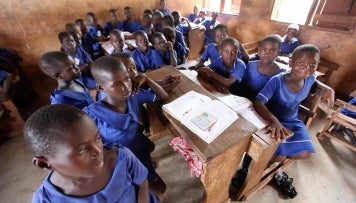
Photo: Mirzobek Ibragimov / World Bank
A new education funding project using social impact bonds (SIBs) seeks to help increase the number of children ages 3-7 enrolled in preschools in disadvantaged urban areas across Uzbekistan. The planned program is made possible through a $4.85 million grant provided by the World Bank’s Global Partnership for Results-Based Approaches (GPRBA).
This GPRBA-funded preschool education project is a component of the World Bank’s Promoting Early Childhood Development Project, financed through a $59.5 million credit from the International Development Association (IDA), with an additional grant of $9.5 million from the Global Partnership for Education (GPE).
Access to quality early childhood education services, including preschool, can provide crucial support during the early years of a child’s development, while also facilitating their readiness for school. According to a World Bank study, there is a correlation between preschool attendance and employment outcomes, such as having a better formal sector job later in life. Since the public preschool infrastructure hasn't yet reached all children nationwide, the Government has opened the sector to private service participation to accelerate coverage and meet the growing demand.
The SIB component supported by GPRBA is one example of the private sector’s efforts, and is designed to attract investors’ funding to support key activities in private pre-school education, such as teachers' training and the provision of child-centered teaching and learning materials. This is GPRBA's first attempt to use a SIB, with the objective of fostering public-private partnerships that tie financial returns and payments to rigorously measured and predefined results, intended to deliver the desired educational services in 140 private preschools in urban areas.
An impact bond is a type of results-based financing and an innovative type of public-private partnership that rewards investors for successfully delivering positive social outcomes. The funds provided upfront by the investors for social projects help service providers who lack cash flow to focus on service delivery and achieve results. This type of results-based financing has demonstrated the ability to attract private investment in historically “non-bankable” projects, particularly in the social and environmental sectors.
How are investors paid? The project's performance is what determines investors' returns. Among the measurable outcomes are the occupancy rate in the participating preschools, enrollment of economically disadvantaged or disabled children , and improved learning environment.
Given the health, economic and societal benefits attributable to early childhood development and preschool education, the Government has diversified its financial sources and expanded participation in its commitment to provide universal access to all preschool children. While much progress has been made in recent years regarding improved preschool access to just over half of children ages 3-7, this project based on a SIB helps bridge the financing gap to make private preschools more affordable, an important element to meet the goals outlined in Sustainable Development Goal #4 (“Universal Access to Quality Education”).
------------------------------------------------------------------------------------------------------
Related Story: Investing in Children Means Investing in Uzbekistan’s Future











